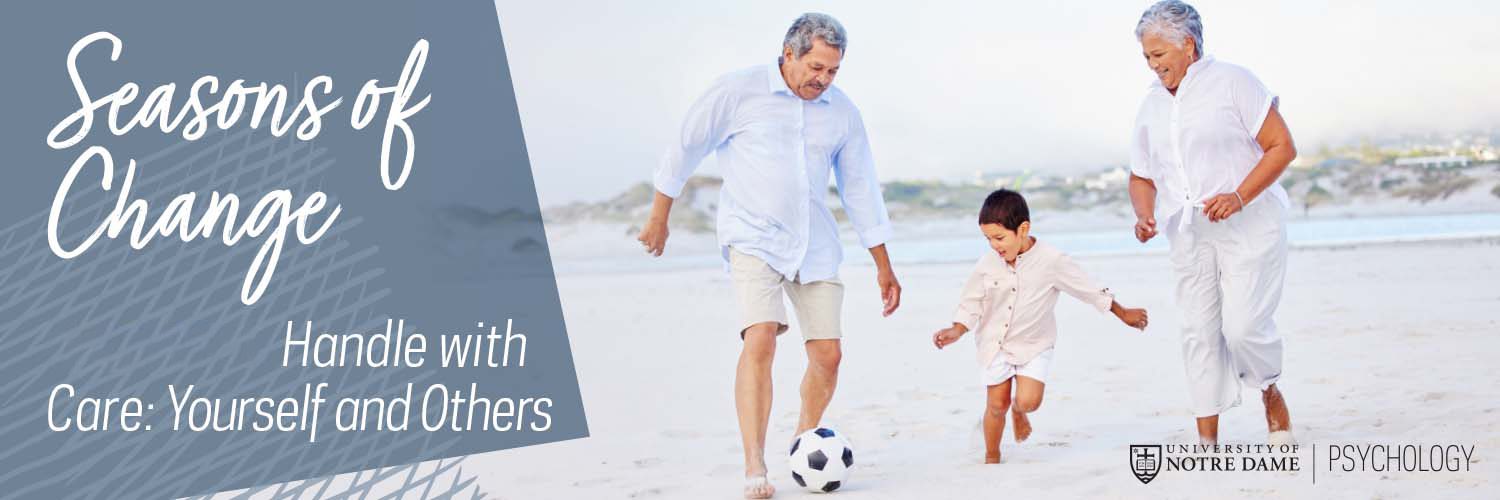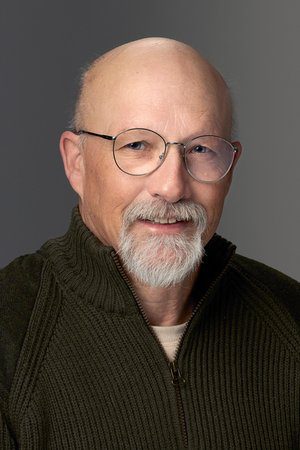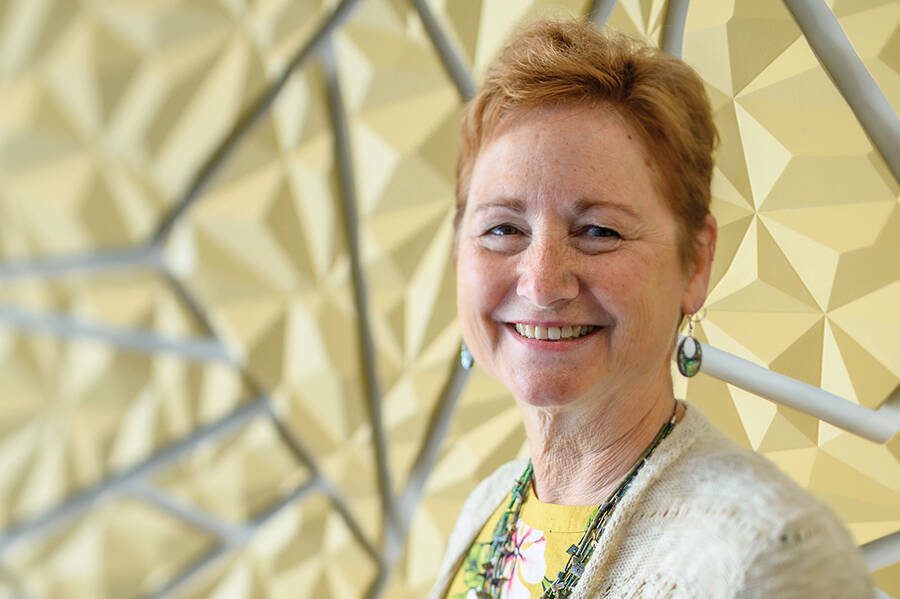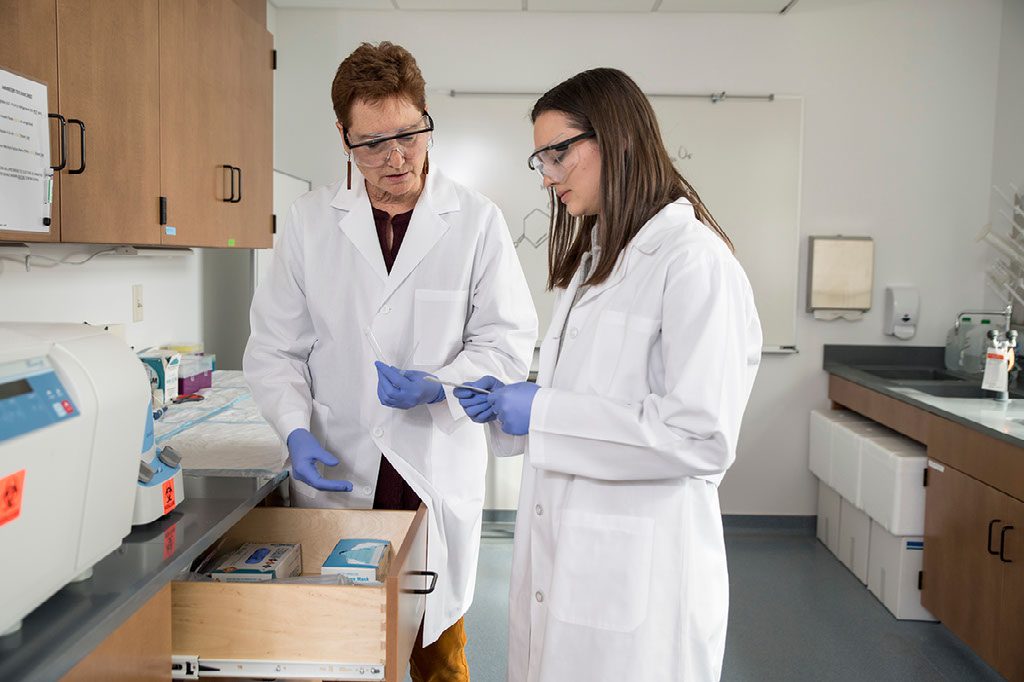Handle with Care: Yourself and Others

How can we adapt with resilience to physical and mental health challenges, disabilities, or diagnoses when it happens to us or our loved ones? How do these situations affect the people closest to the person experiencing the challenge? How can we change our perception of stress from threat to opportunity? Join Notre Dame psychology professor Cindy Bergeman and her husband, architect Dean Bergeman, for an hour of practical advice about how to handle ourselves and those we love with care.
Meet the Faculty: Cindy Bergeman

Cindy Bergeman is a professor and chair of the Department of Psychology and an Associate Vice President for Research at the University of Notre Dame. She received her Ph.D. from the Pennsylvania State University in Human Development and Family Studies. Her research investigates the interplay among stress, resilience mechanisms and health and well-being outcomes in young, middle-aged and older adults. The goal of her work is to understand why some individuals age more successfully than others. Her work is funded by multiple research grants from the National Institute of Aging.
Meet the Speaker: Dean Bergeman

Dean Bergeman is president of Balance Architectural Studio, LLC in South Bend, IN and is an adjunct professor at the School of Architecture and Interior Design at Andrews University in Berrien Springs, MI.
Having Coffee With . . . Cindy Bergeman

A few years ago, Cindy Bergeman and her husband bought a second home in the mountains of Colorado. They spend summers and vacations there, and she’s come to think of those visits as practice for retirement.
In a way, Bergeman has been preparing for retirement her entire career.
A developmental psychologist who joined the Notre Dame faculty in 1990, Bergeman studies resilient aging: What allows some individuals to maintain their health and well-being into their senior years better than others do?
“We’re really trying to understand the extent to which we can help people create these resilience factors,” says Bergeman, the director and principal investigator of the University’s Adult Development & Aging Laboratory.
The coronavirus pandemic proved to be both a hindrance and an opening to her work. It delayed in-person research but created a once-in-a-lifetime chance to study the impact of pandemic stress. “This is going to sound terrible, but [COVID-19] was a great opportunity,” says the former Notre Dame associate vice president of research. “We had an opportunity to really step right in and start collecting information very early on so that we could look at how people navigated it.”
Volunteers for her lab’s COVID-19 resilience study range in age from 19 to 93. “One of the things that we found is that older adults actually coped with the pandemic better than younger adults,” Bergeman says. Based on interviews, the research affirmed that many older adults were especially worried about getting sick. So when the first stay-at-home recommendations were issued in spring 2020, many senior citizens followed that advice and adapted. Some used Zoom to keep in touch with loved ones and learned how to order their groceries online. Others maintained social contact via telephone or the internet. And those who had to stop attending in-person religious services often pivoted to faith programming on television or on the web.
Adults in their 20s and 30s experienced the most pandemic-related stress, the research showed. Many became extra busy working their jobs — either in person or remotely — adapting to COVID-induced changes in daily life and being responsible for family members’ safety.
“They were more likely to be in the workforce. They were worried about bringing COVID back home to their family. So the younger adults were really having difficulty — rightly so — trying to balance all of those competing demands,” Bergeman says. Further, many children had a hard time with remote learning, adding to parents’ stress load as they tried to balance their own work with the support their kids needed to keep up with schoolwork.
“What we did learn across that first year of the pandemic was that people were adapting to the change,” Bergeman says. “As long as they understand what they need to do, they’re pretty good at coming up with solutions.”
Rather than major life events, the psychologist says, it is the day-to-day stuff ‘that really has a detrimental effect on our health.’
During childhood and adolescence, people develop what Bergeman calls a “coping toolbox” — methods of responding to stress and hardship. “We know from research, some tools are better than others, but having a lot of tools is also beneficial,” she says. “One of the best tools is to be able to reframe things in a more positive way and see these experiences as opportunities and not as threats.”
She zeros in on how stress affects people’s health, well-being and cognitive function. “Stress is not just one thing. It may be a single physiological response that we have that’s evolutionarily beneficial in the short term, but not beneficial in the long term,” she says.
Psychologists used to think major life events such as retirement or the death of a spouse had the biggest impact on a person’s resilience, she continues. “But what we’re learning is, it’s the chronic stress, the day-to-day stuff” — personal finances, a bad relationship, a hated job — “that really has a detrimental effect on our health.” COVID-19 has intensified such stressors for many people, she says.
Adversity affects people differently. Some learn from the experience and recreate themselves. Others may give up, become ill or lose hope. So Bergeman keeps returning to a core question: “How can we help people develop some of these protective factors, resilience and resources?”
Stressors may prove hard or even impossible to alleviate. We might not be able to control whether we can land a high-paying job, afford to move out of a declining neighborhood or resolve a troubled relationship, but we can learn skills to cope with our problems.
“If we have difficulty with a certain person or with people, what can we do to minimize that? Is it how we see it? Can we reframe our relationship?” the researcher asks. “Sometimes that’s really hard to do, and it takes two people to do it, but we can help people see relationships differently.”
A positive response might involve limiting contact with someone who is a source of negativity. When it comes to financial woes, one can rethink a budget. If such changes aren’t possible, a person might instead refocus on a more satisfying aspect of life, Bergeman says.
She and her husband have two adult daughters and two grandchildren. She gets many questions from parents about how to make their own children more resilient.
“Parents can do that by not solving their kids’ problems. You can talk through their problems,” she says, but often “help” means helping children learn how to resolve challenges on their own. She doesn’t mean major issues that require parental intervention, but rather those day-to-day childhood problems such as squabbles with friends. It’s often best to let children work out disagreements among themselves. “It’s really helping kids build their toolbox,” she says.
That doesn’t end when a person reaches adulthood, she adds. “It’s something we need to develop across our lifespan, and our toolbox will get more and more sophisticated.”
Anxious adults who swoop in to solve their children’s problems — sometimes called helicopter parents — may produce the next generation of anxious adults. “Feelings that you don’t have the ability to affect change can definitely be transmitted through environmental contacts,” Bergeman says. In such cases, coping strategies may be harder to learn. Children may pick them up from another relative or a mentor, or at an older age.
Just lending an ear and not offering advice can help. “I like people to listen sometimes and not try to solve my problem,” she says. “I have to do what I’m going to do myself. I have to come up with a solution.”
Bergeman seeks to put what she has learned about resilient aging to use in her own life. “I ask myself: ‘Is this going to matter a week from now? Is this a turning point in my life?’ And most of the time the answer is ‘No.’”
When she encounters a disappointment, she gives herself 24 hours to think about it and console herself. Then she moves on.
Exercise can help the body dissipate the fight-or-flight, physiological signs of stress. Bergeman admits she doesn’t enjoy traditional exercise such as working out at a gym. She’d rather hike, ski or kayak, disguising exercise as something she enjoys. Meditation, yoga and prayer also help the body respond to stress.
“I always joke that I’m interested in aging because we’re all aging, and I’m trying to fix myself before I actually get there,” she says. “My husband and I joke that we’re practicing, but we really are kind of transitioning.”
Not that Bergeman, now in her 60s, plans to fully retire. “When I retire, I still want to write. I’ve got this wealth of data that I still want to be able to utilize. So I say I’m practicing retirement, but I also intend to take my career and my research into retirement,” she says.
People who most successfully negotiate the transition to a healthy and happy old age usually are those who keep on learning, socializing and contributing to society after formal retirement, her research shows.
The best predictor of longevity is feeling that you have purpose in life. “That you have a reason to get up every morning, to get dressed and to get going,” Bergeman says. “That is something that we have to create for ourselves. And that helps us keep going.”
This article was originally published in Notre Dame Magazine in Autumn 2021 and was written my Notre Dame Magazine Associate Editor Margaret Fosmoe ’85.
The Notre Dame Study of Health and Well-being

For over 10 years, the Notre Dame Study of Health and Well-being at the University of Notre Dame has studied stress and its impact on health and aging. Through the project, the Adult Development and Aging Lab has collected immense amounts of data on an estimated 1,500 people and their experience with routine, daily stressors. Now, with four years of new funding from the National Institute on Aging, the research team will analyze how everyday stress and someone’s ability to regulate their response can benefit or impede health nearly a decade later as well as provide direction for stress prevention and intervention strategies.
This research, led by Cindy Bergeman, associate vice president for research and professor of psychology, will utilize information on 300 research participants from previous phases of the study. In those phases, the participants were asked to fill out paper and pencil questionnaires each year, to complete data bursts – from answering daily questions for eight straight weeks, five different times across a 10-year period – and to participate in some in-person interviews and health assessments about their daily life, their stresses and uplifts, and their resiliency resources.

“Stress from difficult relationships, financial issues, or other daily pressures can become chronic,” said Bergeman. “And even though the everyday stressors someone faces are not physical in nature, the body produces the same ‘fight or flight’ response as if they were. In the short term this can be advantageous, but over a lifespan this response may lead to morbidity and mortality.”
To read more, click here.
View the Event
How can we adapt with resilience to physical and mental health challenges, disabilities, or diagnoses when it happens to us or our loved ones? How do these situations affect the people closest to the person experiencing the challenge? How can we change our perception of stress from threat to opportunity? Join Notre Dame psychology professor Cindy Bergeman and her husband, architect Dean Bergeman, for an hour of practical advice about how to handle ourselves and those we love with care.
